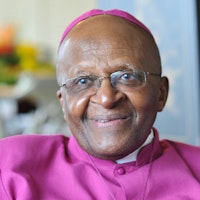Certainly it is from experiencing this generosity of God and the generosity of those in our life that we learn gratitude and to be generous to others.
Desmond Tutu

Generosity and Gratitude
Topic: Gratitude
Like humility, generosity comes from seeing that everything we have and everything we accomplish comes from God’s grace and God’s love for us… Certainly it is from experiencing this generosity of God and the generosity of those in our life that we learn gratitude and to be generous to others.
Desmond Mpilo Tutu (7 October 1931 – 26 December 2021) was a distinguished South African Anglican Archbishop and theologian known globally for his dedicated work as an anti-apartheid and human rights activist. His involvement in the fight against racial segregation in South Africa during the apartheid era was steadfast and resulted in significant contributions to the nation's quest for racial equality. In recognition of his efforts, Tutu was awarded the Nobel Peace Prize in 1984. His leadership and moral courage were instrumental in transitioning South Africa towards a more reconciled society.
Tutu was deeply religious and his belief in God, perceived as both a Heavenly Father and Heavenly Mother, played a major role in his life and advocacy. This belief, which extended beyond traditional Anglican theology, played a significant role in his stance on gender equality. His faith, therefore, wasn't simply a personal doctrine, but it also guided his public advocacy and influenced his approach towards human rights.
Tutu was also a strong proponent of Ubuntu, an African philosophy that stresses the interconnectedness of humanity. This concept aligns with the idea that one's well-being is tied to the well-being of others. Tutu's acknowledgment of advancements in human rights and his continued efforts for improvement were reflective of this philosophy. Despite the challenges he faced during the apartheid era, Tutu remained committed to advocating for a world where peace, justice, and dignity were accessible to everyone. Through his lifetime, Desmond Tutu left an enduring mark on society, and his legacy continues to inspire those who pursue equality and human rights.
God Has A Dream
Tutu. Desmond. God Has a Dream: A Vision of Hope for Our Times. Edited by Douglas Abrams, Rider, 2004.

Desmond Tutu
Theme: Gratefulness

About This Desmond Tutu Quotation [Commentary]
Desmond Tutu roots generosity where he also roots humility: in “seeing that everything we have and everything we accomplish comes from God’s grace and God’s love for us.” When that is the starting point, we live from what is given—grace and love—rather than from self-reliance.
From there he is direct: “Certainly it is from experiencing this generosity of God and the generosity of those in our life that we learn gratitude.” We learn it by receiving and recognizing “the generosity of those in our life” as gift, not guarantee—care that arrives through one another, through ordinary kindness and timely help.
And Desmond Tutu links that receiving to what follows: we “learn gratitude and to be generous to others.” What we have “from God’s grace and God’s love for us” becomes a way of living with an open hand. Gratitude is not only words; it is the practice of choosing “to be generous to others,” passing on what we have first been given.
Spiritual Practice: Journaling for Gratitude
Gratitude, as we have seen, is an extremely important part of joy because it allows us to savor life and to recognize that most of our good fortune in life comes from others. The gratitude practice is very simple. To expand it you can go back to the humility practice, which also involves gratitude and appreciation for all those who have made it possible for you to be you. The gratitude practice is meant to be one you can do daily, to help you appreciate large and small blessings. This practice can also be done at the end of the day, when reflecting on whether you fulfilled the intention you set in the morning. You can also do this practice together with your spouse or a friend.
—Douglas Abrams with the Dalai Lama and Desmond Tutu [From “The Book of Joy,” The Eight Pillars of Joy, #6. Gratitude: I Am Fortunate to Be Alive] pp. 336-337.
Additional Desmond Tutu Quotes
Gratitude: I Am Fortunate to Be Alive
Gratitude is fundamental to joy. It, quite literally, allows us to generate our own happiness.
“Gratitude,” writes Abrams, “is the recognition of all that holds us in the web of life and all that has made it possible to have the life that we have and the moment that we are experiencing.” It allows us to shift our focus from what we lack to what we have. If acceptance is not fighting reality, gratitude means embracing it, counting blessings rather than burdens.
Our minds have a naturally negative bias—after all, being able to point out what is wrong or dangerous is advantageous to survival. But we need to be conscious of this, and purposeful in our gratitude. Our time on Earth is limited. Why waste it by miring ourselves in negativity?
Gratitude also connects us to others. When we are truly grateful, we remember all of those who help make our happiness possible, who bring goodness into our lives. We, then, are able to recognize those people, and enjoy them and their differences.
In this way, we can be made joyful by the world and people around us, instead of finding ourselves filled with anger and despair.
—Douglas Abrams with the Dalai Lama and Desmond Tutu [From “The Book of Joy,” The Eight Pillars of Joy, #6. Gratitude: I Am Fortunate to Be Alive].
Resources
Related Quotes
Copyright © 2017 – 2026 LuminaryQuotes.com About Us